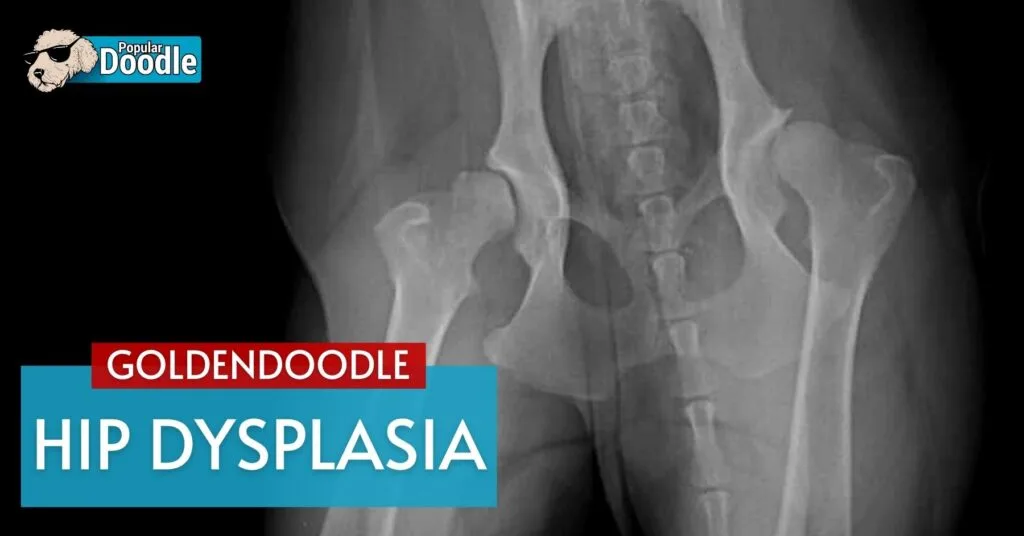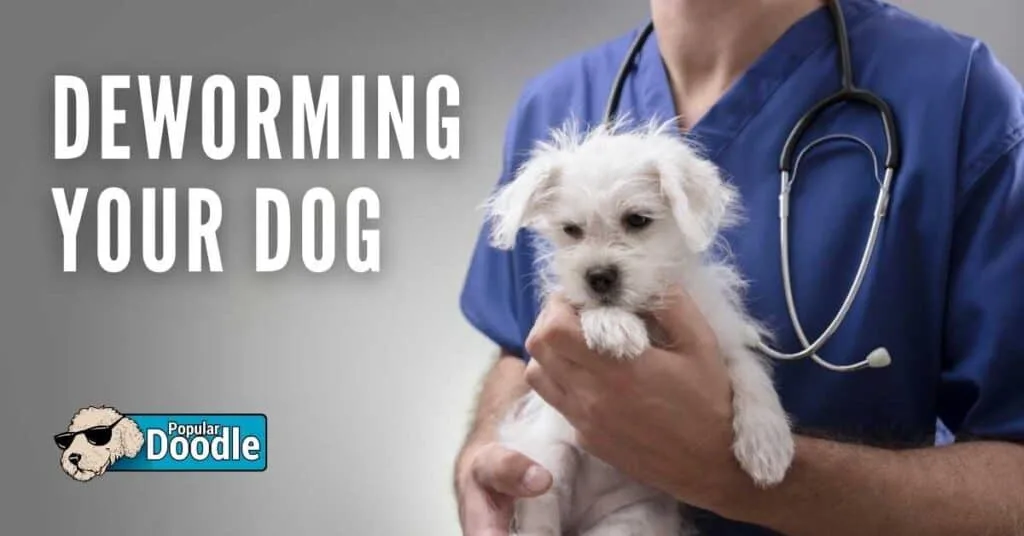By Dr. Merliza Cabriles, D.V.M.

Goldendoodle Itching, also known as pruritus, is a very common skin problem. Itching is not a disease in itself, but rather a sign of an underlying issue.
The list of causes for Goldendoodle itchy skin is quite long. Some of the more common reasons include allergies, infections, and parasites.
In some instances, a skin problem may not have Goldendoodle itching as one of its early signs but when secondary bacterial or fungal infection sets in, itching can be one of the prominent symptoms. The itching may be confined to one area of the body or it could generalized where it involves a larger area.
Itching, or pruritus, is a vicious cycle! Persistent Goldendoodle scratching and chewing can break down the skin’s natural barrier, making the body surface more vulnerable to allergens and irritants in the environment.
An itchy Goldendoodle can have red areas of skin that are inflamed. Pus may be present when bacterial infection sets in. Severe cases of pruritus can lead to hair loss and scabs. Self-trauma can lead to raw and bleeding skin.
Certain medications may alleviate itching, but if the underlying health issue is not identified and addressed properly, the itching will persist causing affected dogs to constantly scratch and bite at their skin.
Without appropriate medical intervention, itchy skin can adversely affect a Goldendoodle’s health and quality of life.
Did you know? Even something as simple as itchy skin can be the sign of a more severe medical condition that can be expense to treat. Being proactive by investing in pet insurance can help you avoid these huge expenses and ensure your dog always gets the best treatment available. We recommend you get an instant, online quote from Healthy Paws Pet Insurance.
Why is My Goldendoodle So Itchy?

Goldendoodle Allergies
Certain substances in a Goldendoodle’s immediate environment, both natural and man-made, can trigger allergic reactions in hypersensitive dogs. These substances are called “allergens.”
When a dog is exposed to an allergen, an immune reaction is initiated. The protein molecule in the allergen combines with antibodies that are in the blood and then attaches to a mast cell, a type of cell that is found in many body tissues.
This reaction between the protein molecule (antigen), antibody, and mast cells causes the release of histamines from mast cells. These potent chemicals cause local inflammation which is characterized by redness, itching, and swelling which are classic signs of an allergic reaction.
Common Symptoms of Goldendoodle Allergies
Allergy symptoms in Goldendoodles may affect one or more systems of the body. It could affect the skin, respiratory system, eyes, ears, and digestive system.
- Skin itching could affect a small area of the body (localized) or all over the body (generalized)
- Chewing or biting of the paws
- Obsessive licking
- Coughing, sneezing, and/or wheezing
- Runny discharge from the eyes or nose
- Digestive symptoms such as vomiting and diarrhea
- Chronic ear infection
- Skin rashes and hives
- Hair loss
- Itchy rear end
- Chronic flatulence (gassiness)
Types of Allergens
Airborne Allergens
Pollen is a very common allergen. In this case, Goldendoodle scratching tends to increase and worsen during certain seasons of the year.
Mold
Mold is formed from a variety of fungi that can thrive in dark, damp places. Goldendoodles can get exposed to mold when they play or spend some time in places where mold is present such as behind the stairs or in the basement.
Chemicals
Skin rashes tend to form in hypersensitive Goldendoodles after getting into contact with certain chemicals.
The most common chemical allergens are present in soaps, shampoos, and dyes. Chemicals in soap can be extremely irritating to dogs. This is also called “contact dermatitis.”
Food
Goldendoodle itching could also be a result of an allergic reaction to a certain ingredients in pet food.
The most common allergens in pet food include artificial food colors and preservatives, fillers, dairy products, pork, fish, chicken, lamb, beef, soy, or gluten.
Take note that initial reactions may be mild but with continued exposure to the allergen in pet food, there is a risk of a more severe reaction that could be life-threatening.
To identify which pet food ingredient your Goldendoodle may be allergic to, your vet will likely start your dog on an elimination diet.
This is achieved by feeding your Goldendoodle with a meal that consists of only one or two types of foods, usually a protein and carbohydrate source. Common examples include fish and rice or rabbit and potato.

Atopy
One common type of allergy that can be inherited is “atopy.” Also called, “canine atopic dermatitis” or “allergic dermatitis,” affected dogs start to manifest signs of this condition between 1 and 3 years old.
Breed Predisposition
While any dog breed can develop skin allergies and other itchy conditions, many purebred dogs are genetically predisposed to skin problems. These predisposed breeds include both the Golden Retriever and the Poodle.
While intentional mixed-breeds such as Goldendoodles benefit from a slight amount of hybrid vigor, it’s not nearly the same health advantage as unintentional mixed breeds, or mutts, typically enjoy.
To learn which health issues your dog may be predisposed to, Embark offers a simple, mail-in cheek swab kit which tests for over 200 conditions. The results can help you and your veterinarian come up with a prevention or treatment plan as early as possible. This is valuable information for any dog owner!
Parasites
Flea Allergy Dermatitis (FAD)
While some Goldendoodles just experience minor itching when bitten by fleas, some have more adverse reactions because they are allergic to antigen proteins that are present in the saliva of fleas.
Even a flea bite or two can cause intense itching and discomfort in these hypersensitive dogs. Without prompt intervention, severe itching may persist for 2 weeks or more.
Persistent scratching, licking, and chewing of affected areas can damage skin surfaces causing bleeding and irritation. Other symptoms of FAD include hair loss and the appearance of small, reddish raised bumps.
In the US, FAD is the top skin disease in dogs. Cases usually increase during summer when it’s flea season.
Mites
Mites are microscopic creatures that burrow under the skin of dogs and cause irritation and inflammation. There are also mites that live in the ears of dogs.
Mites cause “mange” in dogs. The most common mites that affect dogs are Sarcoptes scabiei var canis (Sarcoptic mange), Demodex canis (Demodectic mange), and Otodectes cynotis (ear mites).
Sarcoptic Mange
Sarcoptic mange, or scabies, is zoonotic, meaning it can be transmitted from pets to people. It is also highly contagious to other dogs.
As mites burrow into the skin, it causes intense itching. Scratching, chewing, and biting at affected areas can eventually lead to raw skin and the formation of thick, crusted sores. The damaged skin becomes favorable for secondary yeast or bacterial infections.
The sores are usually seen first on the dog’s chest, ears, abdomen, elbows, and legs. Without treatment, the sores eventually spread over the entire body.
Goldendoodles with chronic mange have oily dandruff (seborrhea), build-up of crusty, wrinkled and thickened skin, and oozing sores. Severe cases can lead to emaciation and possibly death.
Ear Mites (Otodectic Mange)
The mites are often present in the external part of the ear and cause inflammation of the ear canal. Affected Goldendoodles often shake their heads and scratch their ears.
In severe cases, itching and irritation cause the external ear to become inflamed and there may be pus. The dog’s eardrum may also be torn.
Demodectic Mange
The mites are normally found in small numbers in the hair follicles and sebaceous glands of Goldendoodles.
Problems occur when there is an increase in the mite population, leading to skin inflammation and hair loss. It is believed that a compromised immune system and heredity are important predisposing factors.
Vaccinations
Vaccines are generally safe but some dogs may react to vaccinations, most of which are mild and self-limiting. Like people, a Goldendoodle that has just been vaccinated may experience fever, loss of appetite, and sluggishness.
These symptoms usually resolve without treatment. A moderate reaction to vaccination is the development of hives and swelling around the eyes, lips, and neck. The dog may also suffer from extreme itching.
Dry Skin
There are various factors that cause skin dryness in dogs. Some causes of dry skin in Goldendoodles include environmental conditions, excessive bathing, and the use of harsh soaps.
Related: How Often Should You Bathe a Goldendoodle?
Some common symptoms of dry skin in Goldendoodles are…
- Itchiness
- Flakes and dandruff
- Scaling
- Hair loss
- Dandruff
- Scabs
- Increase in the oiliness of the skin and hair coat
- Distinct odor
Infection
Skin infections caused by bacteria, viruses, or fungi (yeast) can also cause itchy skin in Goldendoodles. The most common culprits are ringworm, pyoderma, and Malassezia.
Poor Nutrition
Nutrition plays a very important role in the health and integrity of the skin and hair coat. Many skin diseases are commonly associated with nutritional deficiencies.
A coarse hair coat, dry and scaly skin, itching, and hair loss are just some of the effects of a poor quality diet.
Compulsive Chewing, Scratching
Stress, anxiety, or boredom can cause some Goldendoodles to develop an obsessive-compulsive disorder that can be manifested as persistent scratching or licking.
Affected dogs usually spend a lot of time alone and/or do not have enough opportunities for physical and mental stimulation.
Pain
Pain caused by underlying conditions, such as arthritis, a healed fracture, or skin disorders, may cause Goldendoodles to lick or chew excessively because the condition may be making them physically uncomfortable. Scratching is a dog’s way of seeking relief from the pain and discomfort.
Hormonal Imbalances
Certain endocrine problems can also be an important reason for your Goldendoodle’s scratching. Changes in the skin because of an under-active thyroid (hypothyroidism) or a hyperactive adrenal gland (Cushing’s Disease) can lead to itching and irritation as well as hair loss.
These changes can eventually pave the way for secondary bacterial or fungal infections, which can only worsen the problem.
Drug Reactions
Some Goldendoodles can develop unexpected reactions to certain medications and experience itching and skin inflammation. Reactions to drugs usually take the form of itchy skin rashes.
How to Soothe Goldendoodle Itchy Skin: At-Home Treatment Options

Apple Cider Vinegar
Apple cider vinegar is known for its antibacterial and anti-fungal treatment.
Make a solution composed of 50% apple cider vinegar and 50% water and place it in a clean spray bottle so you can easily spray the solution all over your Goldendoodle’s itchy spots. Soothe itchy and irritated paws by soaking them in the mixture for about 5 minutes.
A word of caution—avoid using apple cider vinegar on raw skin or open wounds.
Baking Soda
Dry out oozing skin rashes and alleviate itching by applying a thick paste of baking soda mixed with water (50% of each) on affected areas. After 20 minutes, rinse it off completely.
You can add high-quality coconut oil to the water and baking soda mixture to make a moisturizing blend. Baking soda can also be added to your Goldendoodle’s bath for generalized itching.
Aloe Vera
For ages, Aloe Vera has been known for its therapeutic properties. For hot, itchy skin, apply aloe Vera directly to the affected parts of your Goldendoodle’s body.
It can help reduce redness and inflammation. You can use an Aloe Vera plant if you have one, but it’s also available commercially.
One thing to remember when buying Aloe Vera is to steer clear of products that contain alcohol as it can only worsen the symptoms for your pet.
Tea Soaks: Chamomile and Green Tea
Chamomile and green teas are used by humans for soothing itchy, irritated skin and for their anti-inflammatory effects. Tea soaks have been shown to work in dogs, too.
Just fill the sink or bathtub with lukewarm water and let several tea bags steep in the water for at least 3-5 minutes. Remove the tea bags before soaking your Goldendoodle in the mixture for about 5 minutes.
You can also use Chamomile or Green tea for spot treatment of itchy skin patches.
Epsom Salt Soaks
Epsom salts are rich in magnesium. They also possess anti-inflammatory properties.
Dissolve Epsom salt in warm water and apply the soak on your Goldendoodle letting it stay for 5-10 minutes. It can help with soreness and promote healing.
Licorice Root
Licorice root contains a natural form of cortisone which can help soothe skin irritation and alleviate itching. It is also a common ingredient in dog-specific products that are formulated for allergies.
Coconut Oil
Coconut oil offers various benefits, both internally and outside the body. To soothe itchy spots and skin infections, chill the coconut oil to solidify it and massage it carefully into your Goldendoodle’s skin and hair coat.
There are many types of coconut oil but the best ones are those that are organic, unrefined, or virgin coconut oil because these indicate the best quality for your pet.
Colloidal Oatmeal Bath
An oatmeal bath to soothe itchy skin is an age-old remedy that continues to be practiced to this day. It contains avenanthramides and phenols, chemicals that are known to have anti-inflammatory properties.
There are pre-made colloidal oatmeal products that are available commercially, but you can make your own colloidal oatmeal by grinding plain, sugar-free oatmeal. You can also mix the oatmeal with a little water and apply it as a poultice on hot spots or inflamed areas.
When used as a bath, add oatmeal to warm water and let your Goldendoodle soak in it for 5-10 minutes.
Yogurt
Yogurt contains beneficial microorganisms that help create a balance in the gut microbiome. There is a direct link that has been established between the gut microbiome and immune system function.
Adding yogurt to your Goldendoodle’s diet can also help keep yeast infections in check and also help avoid diarrhea.
A Complete and Balanced Diet
Feed your Goldendoodle a premium quality diet that is formulated to provide a complete and balanced ration that is appropriate for your pet’s life stage. If your Goldendoodle has a food allergy, work closely with your veterinarian in identifying the allergen and switching to a new diet.
Omega-3 Fatty Acids
Omega-3 fatty acids promote healthy skin and a healthy coat for your pet.
Essential fatty acids possess anti-inflammatory effects, improve digestion and reduce the response of the immune system to the allergen. It can also help with yeast infections.
The best sources of omega-3 fatty acids are cold-water fish, flaxseed oil, canola oil, and kidney beans to name a few.
Vitamin E
Vitamin E is packed with antioxidants to prevent free radical damage. It also gives additional protection against harmful UV radiation. If your Goldendoodle has dry skin, vitamin E can also be used as a moisturizer.
Do Goldendoodles Have Skin Issues?
Goldendoodles are generally healthy but, like any dog breed, they do have some health issues, many of which are genetic in nature.
As for skin issues, Goldendoodles are prone to the following:
- Allergic Dermatitis or Atopy: The airborne allergens are either inhaled or absorbed through the skin, and triggering a hypersensitivity reaction or allergy.
- Food Allergies
- Hypothyroidism: This happens when the thyroid does not produce enough thyroid hormone resulting in illness.
- Interdigital Dermatitis: Also called “pododermatitis” it refers to the inflammation of the paws.
- Hot Spots
When to See a Veterinarian About Goldendoodle Itching
You should make an appointment with your veterinarian when your Goldendoodle is itching more or when their skin and hair coat don’t appear normal and healthy even after trying some of the applicable home remedies mentioned above.
If your Goldendoodle suffers from frequent bouts of itching and skin irritation, you should have your pet examined by your veterinarian as soon as possible so the underlying cause can be identified and appropriate treatment can be started immediately.
The sooner the problem is diagnosed and treated, the better it will be for everyone.
Have more questions? In non-emergencies, you can live chat with a veterinarian online by clicking here!
More About Goldendoodles…
- Why Do Goldendoodles Smell Bad? Advice from a Veterinarian!
- Do Goldendoodles Have Dew Claws? Pros and Cons of Removal
- Do Goldendoodles Like to Cuddle?

Dr. Merliza Cabriles, D.V.M.
Contributing Professional
Dr. Merliza Cabriles is a licensed veterinarian and university professor with many years of experience in food animal and pet companion medicine. Her passion for writing as well as pet parent education and support is echoed in the articles and ebooks she has written.










